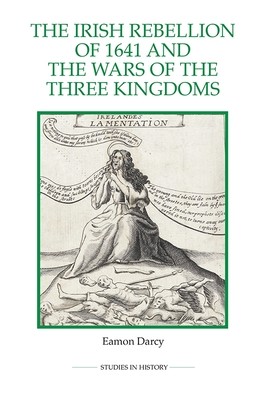
- We will send in 10–14 business days.
- Author: Eamon Darcy
- Publisher: Royal Historical Society
- ISBN-10: 0861933362
- ISBN-13: 9780861933365
- Format: 15.6 x 23.4 x 1.2 cm, minkšti viršeliai
- Language: English
- SAVE -10% with code: EXTRA
The Irish Rebellion of 1641 and the Wars of the Three Kingdoms (e-book) (used book) | bookbook.eu
Reviews
Description
A new investigation into the 1641 Irish rebellion, contrasting its myth with the reality.
After an evening spent drinking with Irish conspirators, an inebriated Owen Connelly confessed to the main colonial administrators in Ireland that a plot was afoot to root out and destroy Ireland's English and Protestant population. Within days English colonists in Ireland believed that a widespread massacre of Protestant settlers was taking place. Desperate for aid, they began to canvass their colleagues in England for help, claiming that they were surrounded by an evil popish menace bent on destroying their community. Soon sworn statements, later called the 1641 depositions, confirmed their fears (despite little by way of eye-witness testimony). In later years, Protestant commentators could point to the 1641 rebellion as proof of Catholic barbarity and perfidy. However, as the author demonstrates, despite some of the outrageous claims made in the depositions, the myth of 1641 became more important than the reality.The aim of this book is to investigate how the rebellion broke out and whether there was a meaning in the violence which ensued. It also seeks to understand how the English administration in Ireland portrayed these events to the wider world, and to examine whether and how far their claims were justified. Did they deliberately construct a narrative of death and destruction that belied what really happened? An obvious, if overlooked, contextis that of the Atlantic world; and particular questions asked are whether the English colonists drew upon similar cultural frameworks to describe atrocities in the Americas; how this shaped the portrayal of the 1641 rebellion incontemporary pamphlets; and the effect that this had on the wider Wars of the Three Kingdoms between England, Ireland and Scotland. EAMON DARCY is an Irish Research Council Postdoctoral Fellow working at Maynooth University, Republic of Ireland.
EXTRA 10 % discount with code: EXTRA
The promotion ends in 23d.17:53:41
The discount code is valid when purchasing from 10 €. Discounts do not stack.
- Author: Eamon Darcy
- Publisher: Royal Historical Society
- ISBN-10: 0861933362
- ISBN-13: 9780861933365
- Format: 15.6 x 23.4 x 1.2 cm, minkšti viršeliai
- Language: English English
A new investigation into the 1641 Irish rebellion, contrasting its myth with the reality.
After an evening spent drinking with Irish conspirators, an inebriated Owen Connelly confessed to the main colonial administrators in Ireland that a plot was afoot to root out and destroy Ireland's English and Protestant population. Within days English colonists in Ireland believed that a widespread massacre of Protestant settlers was taking place. Desperate for aid, they began to canvass their colleagues in England for help, claiming that they were surrounded by an evil popish menace bent on destroying their community. Soon sworn statements, later called the 1641 depositions, confirmed their fears (despite little by way of eye-witness testimony). In later years, Protestant commentators could point to the 1641 rebellion as proof of Catholic barbarity and perfidy. However, as the author demonstrates, despite some of the outrageous claims made in the depositions, the myth of 1641 became more important than the reality.The aim of this book is to investigate how the rebellion broke out and whether there was a meaning in the violence which ensued. It also seeks to understand how the English administration in Ireland portrayed these events to the wider world, and to examine whether and how far their claims were justified. Did they deliberately construct a narrative of death and destruction that belied what really happened? An obvious, if overlooked, contextis that of the Atlantic world; and particular questions asked are whether the English colonists drew upon similar cultural frameworks to describe atrocities in the Americas; how this shaped the portrayal of the 1641 rebellion incontemporary pamphlets; and the effect that this had on the wider Wars of the Three Kingdoms between England, Ireland and Scotland. EAMON DARCY is an Irish Research Council Postdoctoral Fellow working at Maynooth University, Republic of Ireland.


Reviews